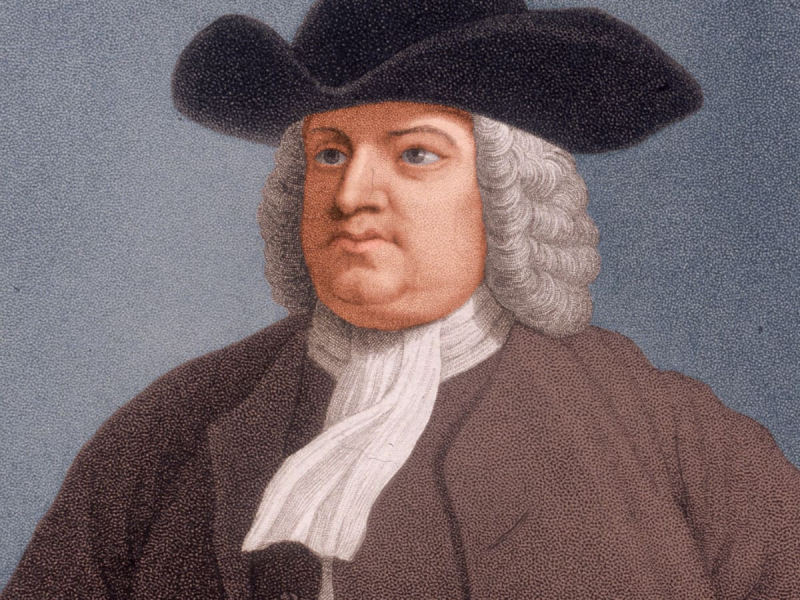William Penn

William Penn was the son of Admiral Sir William Penn and was born into a rich Anglican family. In 1644, he was born in Tower Hill, London, but following a childhood bout of smallpox (during which he lost all his hair), his family relocated to a modest country estate in Essex. He went to Chigwell School and then Christ Church, Oxford.
Early life
Penn's father had inherited a substantial estate in Ireland as a reward for his assistance to Cromwell during his invasion of Ireland. When William Penn was 15, his family fell out of favor with Cromwell and went to Ireland. However, Cromwell died a year later, and Penn's father, as an admiral in the navy, was essential in successfully bringing the exiled Charles II back to England by boat. Penn's devotion was much appreciated by the King, who felt obligated to his family.
While living in Ireland, William Penn was touched by Quaker Thomas Loe's sermon, which piqued his interest in the nonconformist religion. Later, he reflected on how this fascination was accompanied by mystical experiences.The heart of the Quaker religion was the belief that there should be no middleman between man and God. As a result, Quakers refused to pledge allegiance to either the king or Parliament. This was radical opposition during the turmoil of the English Civil War.Penn returned to England and enrolled in Christ Church, Oxford University, where he became more involved in debating dissenting theological beliefs with other academics.
When Oxford theologian John Owen was sacked and censured for his dissident ideas, Penn supported the dean and continued to interact with him. Because of his attitude, the university penalized him, and his father, concerned about the harm to the family's name, pulled him from Oxford and later sent him to Paris, thinking he would change his extreme beliefs. However, in Paris, he received more spiritual concepts from Moise Amyraut, a Christian humanist whom Penn admired.Penn returned to London to study law, but the city was soon ravaged by the disease and subsequently the Great Fire of London; as a result of the plague, Penn briefly relocated to Ireland.
Penn was incarcerated on multiple occasions. While incarcerated in 1669, he penned No Cross, No Crown (1669). It expanded Quaker thought in an interesting way and is considered a masterpiece of prison literature. Additionally, he penned the introduction to the George Fox Journal. In these essays, he extolled the advantages of early, "primitive," Christianity, which placed a strong focus on personal communion with God prior to the rise of established churches. Penn rose to prominence as one of the major Quaker advocates. Despite the fear of imprisonment, he was unflinching in his criticism of political and ecclesiastical establishments and provided a strong presentation of his religious principles. Without the reputation of his family, Penn might have faced harsher penalties. However, Penn started preparations to emigrate to North America, where there was a reputation for greater religious tolerance, given the environment of animosity toward Quakers.
Founding of Pennsylvania
With a group of other Quaker businessmen, Penn started laying the groundwork for a brand-new settlement in New Jersey in 1677. Penn enthusiastically created a charter of privileges for the community while he was still in England. He promised free and fair jury trials, freedom of religion, free and fair elections, and freedom from unjust imprisonment based on his own experiences. Charles II left a legacy that aided the settlement since he was ready to give these political and religious rebels a surprisingly generous territory because he believed he owed Penn's father a lot of money (Charles possibly saw this as a good way to be rid of troublemakers). The new community was known as Penn and Sylvania (after Sir William Penn) (woods) With the help of this Royal bequest and some persuasive haggling, Penn was able to acquire 45,000 acres of property.
The model town enacted the groundbreaking rules of free elections, fair trials, and a separation of powers as well as freedom of worship (for those who believed in God). The Pennsylvania Frame of Government (1682) contained concepts that would serve as the cornerstone of the American constitution. Penn's belief in the division of powers stemmed from his desire to limit the potential for one man to rule in a tyrannical manner. According to him, the constitution would leave present and future mankind with: “no power of doing mischief, that the will of one man may not hinder the good of a whole country.”
A guarantee of religious tolerance drew people from all over Europe to the new colony, including religious minorities like Quakers, French Huguenots (French Protestants), Amish, and Mennonites. Penn departed England in 1682 to assist in the construction of the metropolis he had imagined in his writings. He played a key role in putting his speculative policy recommendations into practice. Penn mixed pragmatic realism with idealism which was on the verge of utopianism. When a practical answer was required, he tried to uphold his belief in liberal government.
Penn introduced a more lenient judicial system. Only two murder and treason offenses received the death penalty (there were 200 capital offenses in England). Additionally, he aimed to transform jails into modern centers of rehabilitation rather than punishment. In addition to treating and decriminalizing mental illness, Quakers were pioneers in the field. Pennsylvania flourished as a hub of trade and research thanks to the extensive provision of education. Additionally, Penn enacted stringent, "puritanical" regulations on "immoral practices," outlawing cockfighting, gambling, and defining standards for intoxication, profanity, and lying.
Accord with native Indians
In addition to studying Pennsylvanian city politics, he also traveled across the interior of New Jersey, making friends with native Indian tribes, particularly the Lenni Lenape Indians. He became familiar with the primary tribes' languages and dialects, which improved communication and promoted harmony. Penn made sure that the Indian tribes received a fair price for their land, and this was used as an illustration of how well settlers and native Indians got along.
After the accession of his buddy, the Duke of York, who later became King James, Penn returned to England and used his royal connections to secure the release of political prisoners such as Quakers and John Locke. The later Act of Toleration (1689) contributed to making Penn's and others' call for religious tolerance legal.
An Essay Towards the Present and Future Peace of Europe (1693), one of Penn's utopian works, envisioned an international organization to help prevent violence in Europe.
In order to foster workable solutions and positive ties, he presented the notion of a federation of all the American colonies in 1699. The concept for the future United States of America originated with this. A federation of the European States, which is frequently regarded as the precursor to the European Union, was another notion he put up.
Due to financial issues, Penn was compelled to leave America and return to England in 1701. He was in serious financial trouble as a result of Philip Ford, his financial advisor, defrauding him of a sizable sum. Ford had benefited from Penn's lack of attention to detail by getting him to sign documents without reading them. Penn attempted to sue Ford in court, but his efforts to improve his financial circumstances were generally fruitless. In fact, Penn even spent time in a debtors' prison for bankruptcy in 1702. He struggled with money issues and had a stroke in 1712 that rendered him paralyzed. His final years were not joyful. In Berkshire's Ruscombe, he passed away in 1718.
Penn is regarded as one of America's early founding fathers. He represented the American aspiration to establish a free and just society based on republican ideals. His avant-garde liberal governing ideas were adopted several decades later and included in the new American constitution of 1776.


























